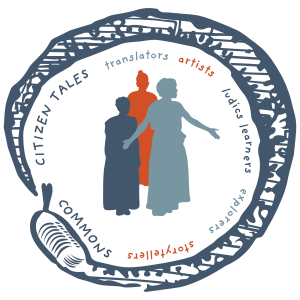The Role of Play in Human Evolution and Public Life: Work, or Play?
We would like to thanks Peter Gray (Boston College) and Peter Levine (Tufts University) for their yesterday talks, "The Role of Play in Human Evolution and Public Life: Work, or Play?" at Harvard University, Mahindra Humanities Center.
Co-sponsored by The Engagement Lab, Emerson College and Citizen TALES Commons, we were so happy to join this talk and would like to share it with you.
Here is the information:
Peter Gray, Boston College
Peter Levine, Tufts University
The Role of Play in Human Evolution and Public Life: Work, or Play?
PANEL SYNOPSIS
The Ludics Seminar, Mahindra Humanities Center, Harvard University will kick off its 2019-2020 series of talks with a panel discussion between Professor Peter Gray, Boston College, and Professor Peter Levine, Tufts University, on play and public life. Peter Gray will speak about his recent work on play and egalitarianism in hunter and gatherer cultures. Peter Levine will speak about Harry Boyte's notion of public work, teasing out this binary between work and play in public life. If play is a corollary to egalitarianism as Peter Gray suggests, then why is the business of contributing to public life most often associated with work?
“The Role of Play in Human Evolutionâ€
Peter Gray, Boston College
Humans are the only primate (apparently) that can live peacefully, or at least relatively so, in multi-male, multi-female social groups. From an evolutionary point of view, how did we manage that? I will suggest here, based on research among contemporary band hunter-gatherers, that we did it at least in part by expanding upon the general mammalian capacity for play and bringing it into adult social interactions.
“Civic Engagement as Public Work, or Play?â€
Peter Levine, Tufts University
Often, acts of civic engagement are defined as acts that people undertake voluntarily without being paid, such as voting, protest, or discussing issues. The very definition of “volunteer service†is any work for other people that isn’t remunerated. This distinction between work and citizenship goes back to Aristotle. Harry Boyte and other proponents of “Public Work†have criticized it, arguing that it trivializes civic life by reducing it to after-work voluntarism and marginalizes the many ways that paid, employed people contribute to public spaces and institutions. The democracy of ancient Athens was not just a discussion among gentlemen; it was also a set of physical spaces--like the Pnyx, where discussions occurred--that people had built with their hands. However, we are not just public workers and artisans in the common world; we also like to play. We are homo ludens as well as homo faber. Designing civic engagement to be more play-like or game-like has been shown to make it more attractive and productive. So how should we think about the relationship between work and play in the civic domain? And what may happen to that relationship if work disappears for many human beings while opportunities for play expand?
BIOS
Peter Gray is a research professor of psychology at Boston College who has conducted and published research in neuroendocrinology, developmental psychology, anthropology, and education. He is author of an internationally acclaimed introductory psychology textbook (Psychology, Worth Publishers, now in its 8th edition, co-authored with David Bjorklund), which views all of psychology from an evolutionary perspective. His recent research focuses on the role of play in human evolution and how children educate themselves, through play and exploration, when they are free to do so. He has expanded on these ideas in his book, Free to Learn: Why Unleashing the Instinct to Play Will Make Our Children Happier, More Self-Reliant, and Better Students for Life (Basic Books). He also authors a regular blog called Freedom to Learn, for Psychology Today magazine. He is a founding member and president of the nonprofit Alliance for Self-Directed Education (ASDE), which is aimed at creating a world in which children’s natural ways of learning are facilitated rather than suppressed. He is also a founding board director of the nonprofit Let Grow, the mission of which is to renew children’s freedom to play and explore outdoors, independently of adults. He earned his undergraduate degree at Columbia College and Ph.D. in biological sciences at the Rockefeller University many years ago. His own current play includes kayaking, long-distance bicycling, backwoods skiing, and vegetable gardening.
Peter Levine is the Academic Dean and Lincoln Filene Professor of Citizenship & Public Affairs in Tufts University’s Jonathan Tisch College of Civic Life. He has tenure in Tufts’ Political Science Department, and he also has secondary appointments in the Tufts Philosophy Department and the Tufts Clinical and Translational Sciences Institute. He directs the Civic Studies Major at Tufts. Levine graduated from Yale in 1989 with a degree in philosophy. He studied philosophy at Oxford on a Rhodes Scholarship, receiving his doctorate in 1992. From 1991 until 1993, he was a research associate at Common Cause. From 1993-2008, he was a member of the Institute for Philosophy & Public Policy in the University of Maryland’s School of Public Policy. During the late 1990s, he was also Deputy Director of the National Commission on Civic Renewal. Levine was the founding deputy director (2001-6) and then the second director (2006-15) of Tisch College’s CIRCLE, The Center for Information and Research on Civic Learning and Engagement.
Levine is the author of We Are the Ones We Have Been Waiting For: The Promise of Civic Renewal in America (Oxford University Press, 2013), five other scholarly books on philosophy and politics, and a novel. He has served on the boards or steering committees of AmericaSpeaks, Street Law Inc., the Newspaper Association of America Foundation, the Campaign for the Civic Mission of Schools, Discovering Justice, the Kettering Foundation, the American Bar Association’s Committee for Public Education, the Paul J. Aicher Foundation, and the Deliberative Democracy Consortium.
Co-sponsored by The Engagement Lab, Emerson College and Citizen TALES Commons
